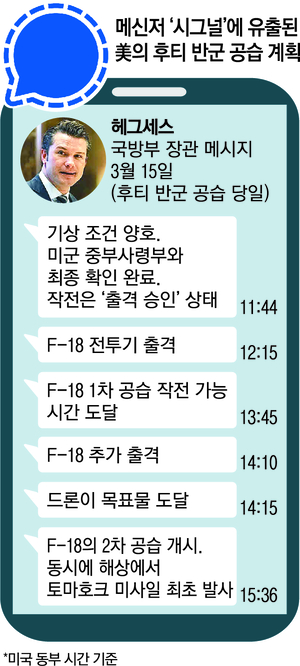
As senior U.S. diplomatic and security officials discussed plans for airstrikes against Yemen's Houthi rebels on civilian messengers, concrete evidence emerged that confidential information had been leaked.
While the White House denied the "confidential leak," it was revealed that U.S. Defense Secretary Pete Hegseth even pointed out the timing of the airstrike and a list of weapons to be used for the operation in the chat room.
According to foreign media such as the New York Times (NYT) and CNN on the 26th (local time), the U.S. magazine The Atlantic released a conversation between high-ranking U.S. diplomatic and security officials using the private messenger Signal to discuss and implement the U.S. military's Houthi rebel strike plan over the past 13-15 days. This is evidence secured when Jeffrey Goldberg, editor-in-chief of The Atlantic, was invited to the chat room due to a mistake by U.S. National Security Adviser Mike Waltz.
According to The Atlantic, Minister Hegseth, who participated in the chat room, shared the detailed military operation plans of the U.S. Central Command on the 15th, the day of the airstrike. At 11:44 a.m. Eastern Time on the 15th, he said, "The weather is favorable. Final confirmation with U.S. Central Command. The operation was 'approved for launch' and left an operational plan mobilizing F-18 fighter jets, MQ-9 Reaper drones and Tomahawk cruise missiles from 12:15 p.m. to 3:36 p.m. A message from Waltz and White House Chief of Staff Susie Wiles congratulated them on the success of the operation was still left in the chat after 5 p.m.
This contradicts the White House's claim the day before that no confidential military information existed in the chat room. The previous day, the White House acknowledged that Waltz made mistakes and used "signals" but denied claims that there was confidential information. U.S. President Donald Trump has also expressed his confidence in Waltz, who has been "responsible," calling him a "very good person."
The White House said the White House National Security Council (NSC) and Elon Musk's Government Efficiency (DOGE) team are investigating how Goldberg was invited to the chat room, but still denied the U.S. media's criticism that confidential information existed.
White House press secretary Caroline Levitt told reporters on the same day, "President Trump's views remain unchanged yesterday or today. "I have confidence in the national security team," he said. "Musk said he would put in a technical expert to find out how this (Goldberg's) number was added to the chat room." "I want to evaluate the context of this message as a policy discussion," he said, denying the leak of confidential information.
However, there are reports that President Trump is uncomfortable with Waltz, who is pointed out as the person responsible for the incident. Politico quoted multiple sources as saying, "President Trump was angry and suspicious that Waltz had saved editor-in-chief Goldberg's cell phone number in the first place." In particular, one source told Politico, "The president is upset that Waltz could be so stupid."














